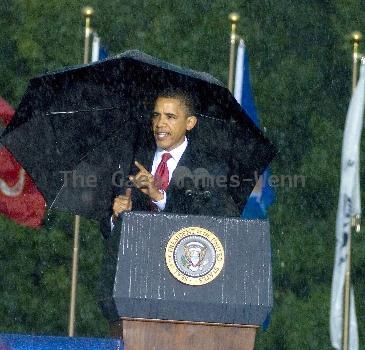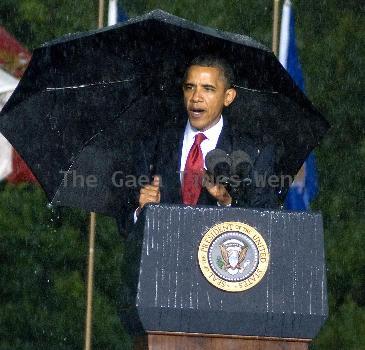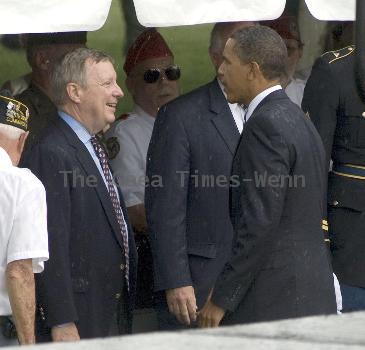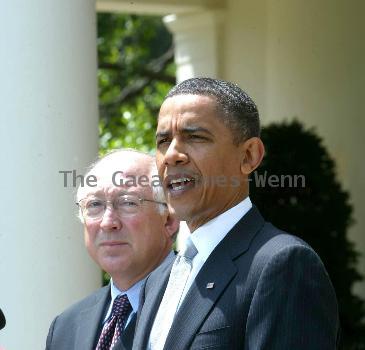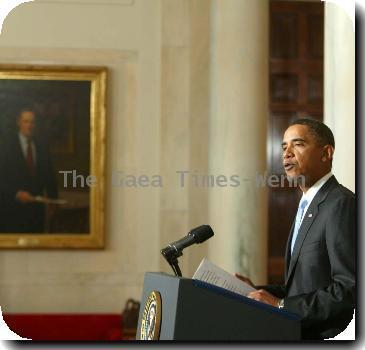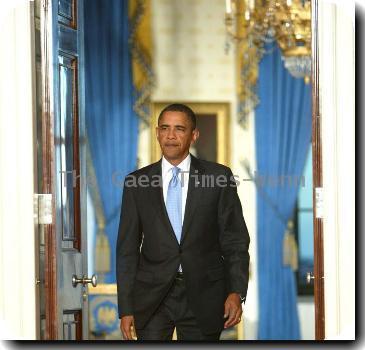Karzai reaffirms goal of having Afghan security forces take lead by 2014
By Rahim Faiez, APTuesday, July 20, 2010
Karzai reaffirms 2014 goal for Afghan-led security
KABUL, Afghanistan — President Hamid Karzai on Tuesday reaffirmed his commitment for Afghan police and soldiers to take charge of security nationwide by 2014 and urged his international backers to distribute more of their development aid through the government.
Karzai spoke at a one-day international conference on Afghanistan’s future that comes at a critical juncture: NATO and Afghan forces have launched a major operation to drive the Taliban out of their strongholds, and the insurgents are pushing back. Rockets fired at the Kabul airport Tuesday forced the diversion of a plane carrying U.N. Secretary-General Ban Ki-moon and Sweden’s foreign minister.
Wearing a traditional striped robe and peaked fur hat, Karzai said that Afghanistan and its Western allies share “a vicious common enemy.” But, he said, victory will come in giving Afghans as much responsibility as possible in combatting the insurgency within its borders. He was flanked by international diplomats including Ban and U.S. Secretary of State Hillary Rodham Clinton.
“I remain determined that our Afghan national security forces will be responsible for all military and law enforcement operations throughout our country by 2014″ — more than three years after President Barack Obama’s date for the start of an American troop drawdown, Karzai said.
Karzai’s reference to a “vicious enemy” appeared at odds with his recent more reconciliatory stance toward the Taliban and willingness to hold peace talks to end the nearly nine-year war amid growing recognition that the insurgents are unlikely to be defeated militarily.
Clinton sought to allay concerns over the US military drawdown.
“We have no intention of abandoning our long-term mission of achieving a stable, secure, peaceful Afghanistan. Too many nations — especially Afghanistan — have suffered too many losses to see this country slide backward,” she said.
NATO Secretary-General Anders Fogh Rasmussen said the alliance will never allow the Taliban to topple the government of Afghanistan. “Our mission will end when — but only when — the Afghans are able to maintain security on their own,” he said.
The prolonged conflict has hobbled development in the impoverished country, and Karzai expressed Tuesday his government’s desire to take charge of more of its affairs. He asked his international partners to channel 50 percent of their foreign assistance through the government within two years, and align 80 percent of their projects with priorities that have been identified by Afghans.
“It is time to concentrate our efforts on a limited number of national programs and projects to transform the lives of our people, reinforce the social compact between the state and the citizens,” Karzai said. “Let us together focus less on short-term projects.”
Since the 2001 U.S.-led invasion that toppled the Taliban, 77 percent of the $29 billion in international aid spent in Afghanistan has been disbursed on projects with little or no input from the government, according to the Afghan Finance Ministry. That figure does not include funds for the training of security forces.
Many donor countries, and particularly the United States, have been reluctant to give an Afghan government infamous for corruption and bloated bureaucracy authority over funds — and so distribute most of their aid through international development groups or contractors. It is widely believed that graft feeds frustration with the Afghan government and boosts support for the insurgency.
Clinton noted that Karzai’s administration had taken steps to fight corruption, but said more needed to be done.
“There are no short-cuts to fighting corruption and improving governance,” she said. “On this front, both the Afghan people and the people of the international community expect results.”
Obama has said he wants to begin withdrawing American troops in July 2011. Though he has stressed the timetable is dependent on security conditions, it has raised concerns in Afghanistan and the region that the U.S. is eager to exit the war.
Delegates will endorse the 2014 goal for Afghans to take charge of security, according to a draft conference communique obtained by The Associated Press — a reminder that Western countries expect to retain forces in Afghanistan for years to come. Even after the government takes over control of nationwide security, there will likely still be a large presence of international troops. Local forces formally took over security in the capital in 2008, for instance, but NATO troops continue to patrol its streets.
A military push in southern Afghanistan has seen violence and casualties rise in recent months. June was the deadliest month for U.S. and international forces with the deaths of 103 service members, including 60 Americans.
On Tuesday, an Afghan soldier started shooting at an Afghan military training base outside the northern city of Mazar-e-Sharif. Two American civilians and two Afghan soldiers — including the shooter — were killed, NATO said. It was not immediately clear if he had been targeting someone or if bullets had gone astray.
In other violence, two NATO service members were killed in bomb attacks in the south. One was American and the other was not, but NATO did not give that person’s nationality. No other details on the attacks were provided.
Also, a suicide bomber struck downtown Kandahar city, hiding explosives in a cart topped with bottles of juice for sale, said Fazel Ahmad Sherzad, the head of security for the provincial police force. The explosion blasted out the windows of a handful of shops and injured two civilians, Sherzad said. The attacker’s legless body lay on the ground in front of one of the shops.
It was not immediately clear if the bomber had a specific target.
Security forces virtually shut down Kabul for the conference. Police added checkpoints throughout the already heavily fortified city and closed major intersections to traffic.
Even so, rockets fire prevented a plane carrying Ban and Sweden’s Carl Bildt from landing at the airport Tuesday morning, officials said.
“Rockets hit the airport just as we were on our way to land,” Bildt wrote on his blog. The plane was diverted to the U.S. Bagram base, outside Kabul, then the diplomats traveled aboard Blackhawk helicopters to the capital, Bildt said. The Swedish Foreign Ministry confirmed the account.
NATO forces confirmed rockets hit around the city overnight but would not say where.
Afghan and international forces raided a compound on the outskirts of Kabul on Monday night, killing several insurgents who were believed to be planning an attack on the conference, NATO forces said in a statement.
The international military coalition said its forces came under fire from men who were barricaded inside buildings in the compound. The statement said two people were arrested in the operation but not how many were killed. Spokeswoman Lt. Commander Katie Kendrick also declined to say how many people were killed in the operation.
Associated Press Writer Mirwais Khan contributed to this report from Kandahar, Afghanistan.
Tags: Afghanistan, As-afghanistan, Asia, Barack Obama, Bombings, Central Asia, Europe, Foreign Aid, Government Regulations, Industry Regulation, Kabul, Kandahar, North America, Shooter, Sweden, Target, United States, Western Europe
